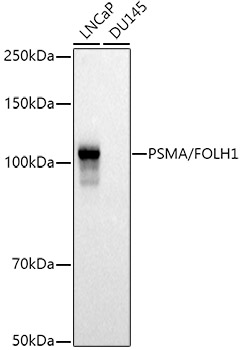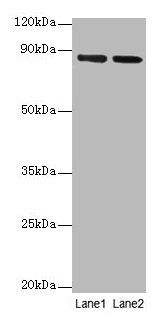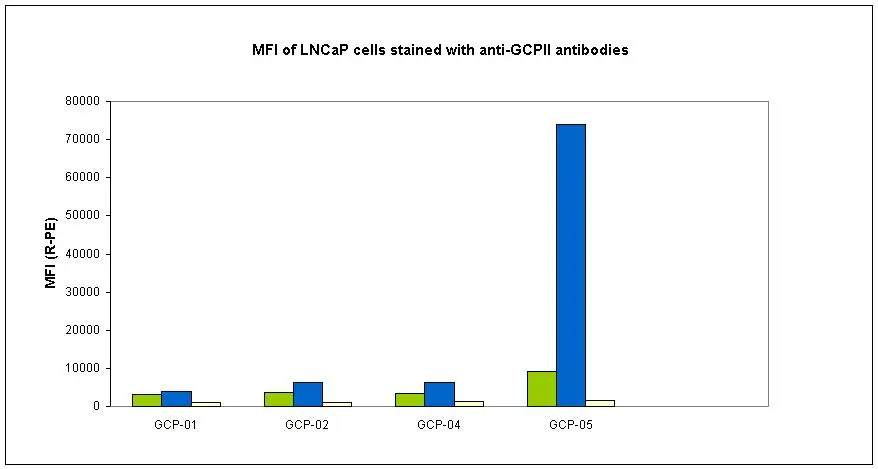PSMA antibody [YPSMA-1]
GTX19071
ApplicationsImmunoFluorescence, Western Blot, ELISA, ImmunoCytoChemistry, ImmunoHistoChemistry, ImmunoHistoChemistry Frozen, ImmunoHistoChemistry Paraffin
Product group Antibodies
ReactivityHuman
TargetFOLH1
Overview
- SupplierGeneTex
- Product NamePSMA antibody [YPSMA-1]
- Delivery Days Customer9
- Application Supplier NoteFor ELISA: Use at an assay dependent dilution. For IF: Use at an assay dependent dilution. For IHC-Fr: Use at an assay dependent dilution. For IHC-P: Use at an assay dependent dilution. For WB: Use at an assay dependent dilution. Optimal dilutions/concentrations should be determined by the researcher.
- ApplicationsImmunoFluorescence, Western Blot, ELISA, ImmunoCytoChemistry, ImmunoHistoChemistry, ImmunoHistoChemistry Frozen, ImmunoHistoChemistry Paraffin
- CertificationResearch Use Only
- ClonalityMonoclonal
- Clone IDYPSMA-1
- Concentration1 mg/ml
- ConjugateUnconjugated
- Gene ID2346
- Target nameFOLH1
- Target descriptionfolate hydrolase 1
- Target synonymsFGCP, FOLH, GCP2, GCPII, NAALAD1, PSM, PSMA, mGCP, glutamate carboxypeptidase 2, N-acetylated alpha-linked acidic dipeptidase 1, N-acetylated-alpha-linked acidic dipeptidase I, NAALADase I, cell growth-inhibiting gene 27 protein, folylpoly-gamma-glutamate carboxypeptidase, glutamate carboxylase II, glutamate carboxypeptidase II, membrane glutamate carboxypeptidase, pteroylpoly-gamma-glutamate carboxypeptidase
- HostMouse
- IsotypeIgG2b
- Protein IDQ04609
- Protein NameGlutamate carboxypeptidase 2
- Scientific DescriptionThis gene encodes a type II transmembrane glycoprotein belonging to the M28 peptidase family. The protein acts as a glutamate carboxypeptidase on different alternative substrates, including the nutrient folate and the neuropeptide N-acetyl-l-aspartyl-l-glutamate and is expressed in a number of tissues such as prostate, central and peripheral nervous system and kidney. A mutation in this gene may be associated with impaired intestinal absorption of dietary folates, resulting in low blood folate levels and consequent hyperhomocysteinemia. Expression of this protein in the brain may be involved in a number of pathological conditions associated with glutamate excitotoxicity. In the prostate the protein is up-regulated in cancerous cells and is used as an effective diagnostic and prognostic indicator of prostate cancer. This gene likely arose from a duplication event of a nearby chromosomal region. Alternative splicing gives rise to multiple transcript variants encoding several different isoforms. [provided by RefSeq, Jul 2010]
- ReactivityHuman
- Storage Instruction-20°C or -80°C,2°C to 8°C
- UNSPSC41116161
References
- Comparative analysis of monoclonal antibodies against prostate-specific membrane antigen (PSMA). Tykvart J et al., 2014 Dec, ProstateRead this paper
- PSMA expression in Schwannoma: a potential clinical mimicker of metastatic prostate carcinoma. Wang W et al., 2009 Sep-Oct, Urol OncolRead this paper
- Prostate-specific membrane antigen expression is a potential prognostic marker in endometrial adenocarcinoma. Mhawech-Fauceglia P et al., 2008 Mar, Cancer Epidemiol Biomarkers PrevRead this paper
- Prostate-specific membrane antigen (PSMA) protein expression in normal and neoplastic tissues and its sensitivity and specificity in prostate adenocarcinoma: an immunohistochemical study using mutiple tumour tissue microarray technique. Mhawech-Fauceglia P et al., 2007 Mar, HistopathologyRead this paper







![FACS analysis of LNCaP (positive, green) and HeLa (negative, blue) cells using GTX80149 PSMA antibody [GCP-05].](https://www.genetex.com/upload/website/prouct_img/normal/GTX80149/GTX80149_20191025_AP_006_391_w_23061322_987.webp)
